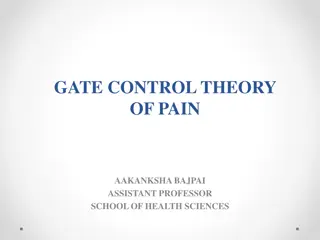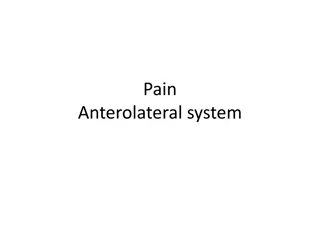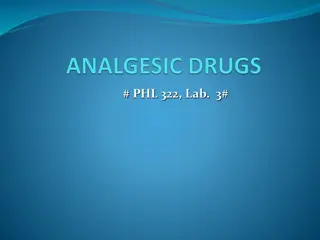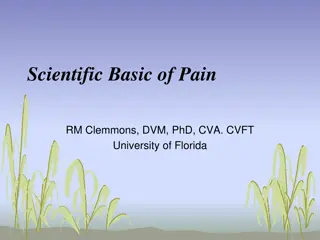Understanding the Gate Control Theory of Pain in Pain Management
This detailed content delves into the Gate Control Theory of Pain, explaining pain pathways involving nociceptors, A-delta fibers, and C fibers. It further explores central pain pathways like the spinothalamic tract, spinomesencephalic tract, and spinoreticular tract. The theory's mechanism of pain
3 views • 11 slides
Understanding Pain: Mechanisms and Pathways
This content delves into the intricate mechanisms of pain perception, exploring the anterolateral system, nociceptors, endogenous analgesic systems, and more. It covers topics such as free nerve endings, VR1/Capsaicin receptors, referred pain, neuropathic pain, hyperalgesia, and visceral pain. The m
0 views • 15 slides
Understanding Pain and Analgesics in Medical Science
Pain is a complex sensory and emotional experience linked to tissue damage, with various types of nerve fibers and nociceptors playing key roles in its perception. Pain mediators like bradykinin and prostaglandins modulate sensitivity to pain stimuli. Analgesics, including non-opioid NSAIDs and opio
0 views • 23 slides
Understanding the Nervous System and Sensory Neurons
The nervous system plays a crucial role in connecting the central nervous system (CNS) to limbs and organs through the peripheral nervous system (PNS). It consists of sensory neurons that transmit impulses from sensory receptors to the CNS, allowing us to perceive and respond to various stimuli. The
0 views • 23 slides
Understanding the Science of Pain and Neural Integration
Pain is a complex sensory and emotional experience linked to tissue damage. It serves as a warning, aids learning, and triggers responses like rest. Key terms include noxious stimuli, nociceptors, pain threshold, and pain tolerance. Neural pathways transmit sensory and motor information, involving a
0 views • 80 slides




